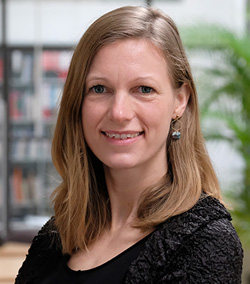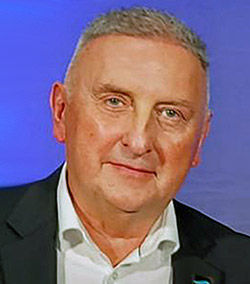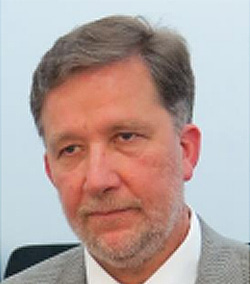Plenarna predavanja
Thematic area: “Inter- and transdisciplinary research in sensitive and protected areas”
Boundary work: Embracing flows of water and knowledge in sensitive and protected areas
Fanny Frick-Trzebitzky (Institute for Social-Ecological Research, ISOE, Germany)
Summary:
Water bodies above and below the surface play important roles in delineating, connecting and circulating of core ecosystem functions. They are thus key in the protection of rare and sensitive areas. Inter- and transdisciplinary approaches allow for embracing the dynamic interactions, systemic vulnerabilities and uncertainties by bringing multiple forms of knowledge into engagement. A key starting point and element is boundary work, i.e. the work on specific questions, matters and concepts as boundary objects that all perspectives can relate to.
Water is also particular, as it does not stick to confined boundaries of a protected area, in both space and time. Inter- and transdisciplinary research on groundwater in the context of different protection zones in Germany and Croatia illustrates dynamics that extend beyond clearly defined geographical areas, including climate change, virtual water trade, remote water supply, tourism, and various policies. The lens on groundwater as a de-localized resource exposes four characteristics of managing groundwater in protected and sensitive areas.
First, as the locations of policy making, trade decisions, production, and consumption are spread across the globe, so are their effects on groundwater quantity and quality. Secondly, systemic interactions between distant social-ecological systems are at odds with rigid governance frameworks for a confined area. Thirdly, time lags between management practices and their measurable impact on groundwater, in combination with uncertainty, raises questions on accountability in conservation of ecosystem services. This is particularly of relevance in karstic regions, where the direction groundwater flows are largely unknown. Fourthly, techno-managerial acceleration in pursuit of achieving water for all is at odds with temporalities of doing research for sustainable and just development of water resource management as questions of resilience and conflict enter public discourse.
These developments show that approaches towards today’s groundwater problems must consider interactions and relations across disciplinary, spatial and temporal divides. Integrative research approaches are central to draw the boundaries of what constitutes the sustainability challenge, to decide who to involve and whom to address in the design of management strategies. Bringing multiple ways of knowing water in protected and sensitive areas into engagement requires constant reflection on what kind of knowledge is valued in research and decision-making on water in sensitive and protected areas.
Keywords: groundwater, knowledge co-production, telecoupling, social ecological systems.

Invited lecturer biography:
Fanny Frick-Trzebitzky holds a PhD in Geography, awarded jointly by the Humboldt University in Berlin and King’s College London. She is a senior researcher at ISOE – Institute for Social-Ecological Research and has a strong background in social-ecological research and sustainable development. Since April 2023, she heads the Practices and Infrastructures Hub together with Immanuel Stieß. Since 2020, she has been leading the junior research group ‘regulate – regulation of groundwater in telecoupled social-ecological systems’ together with Dr. Robert Lütkemeier. Throughout her academic and professional journey, she has focused on investigating institutions and social inequalities related to water access and adaptation. She has published on adaption towards flood risk and sea level rise, socio-technical innovations in water re-use, socio hydrology, and groundwater in telecoupled social-ecological systems. She has furthermore conducted research on social-ecological conflicts, river restoration and green and blue infrastructures in urban areas. She has conducted research in Ghana, Namibia and Germany. Her current research is on groundwater governance in Europe.
Thematic area: “Effective water and wastewater management in sensitive and protected areas under climate change”
Novel Approach to Integrated Coastal Waters Prevention and Pollution Control Modelling – Case Study Poreč
Damir Brđanović (IHE Delft Institute for Water Education, Delft University of Technology, Netherlands)
Summary:
The subject of this keynote is the recent example of a state-of-the-art approach for integrated wastewater management in the city of Poreč in Croatia. “Project Poreč” (2014-2023) is one of the Croatian largest investments in urban water infrastructure that included construction of 61,4 km sewerage and reconstruction of 22,7 km of the existing network, construction of 32 pumping stations and reconstruction of 50 existing pumping stations, construction of 4 wastewater treatment plants (total capacity of 137.500 ES), solar drying sludge plant (2,880 t/yr) and composting plant (1.920 t/yr). “Study Poreč” (2018-2022) is a complementary extension of the “Project Poreč” with objectives to (i) validate the effects of investments in the wastewater management infrastructure, (ii) provide the evidence of the protection of the bathing water quality along the stretch of 23 km of the coast, and (iii) evaluate the effects of the project under different scenarios (winter vs summer, low load vs high load, present (2022) vs future (2045) situation)). The Study, the first of this kind in Croatia, is based on application of mathematical modelling to three distinguished but connected systems, namely: sewerage network, wastewater treatment plants, and coastal waters. The “Study Poreč” demonstrated the positive effects of the “Project Poreč”: the seawater quality satisfied Croatian standards for bathing waters both for present and future scenarios, the sewerage system is capable of handling the peak loads during the touristic season, also in the future, and the four wastewater treatment plants have already shown promising performance during the start-up operation and were assessed as capable of reaching the designed standards for the present as well as future flow and load. In addition, it was demonstrated that application of models allows for evaluation of designs as well as for scenarios analysis, modelling studies can provide new insights, models can be used by staff for regular monitoring and evaluation, and the results of modelling can be used for dissemination, promotion, education and general public information and awareness. It was recommended that, given the undisputed benefits, modelling become obligatory component in wastewater projects in Croatia.
Keywords: modelling, sewerage, wastewater treatment plants, seawater quality.

Invited lecturer biography:
Damir Brdjanovic is Professor of City-wide Inclusive Sanitation at IHE Delft Institute for Water Education and Endowed Professor at Delft University of Technology. Areas of his expertise include pro-poor and emergency sanitation, faecal sludge management, urban drainage, and wastewater treatment. He is a pioneer in the practical application of models in wastewater treatment practice in developing countries. He is co-inventor of the Shit Killer® device for excreta management in emergencies, the award-winning eSOS® Smart Toilet and the medical toilet MEDiLOO®, with funding by the Bill & Melinda Gates Foundation. He has initiated the development and implementation of innovative didactic approaches and novel educational products (including e-learning) at IHE Delft. Brdjanovic is co-founder and director of the Global Sanitation Graduate School, the world’s largest network for postgraduate education on sanitation. In addition to 20 PhD fellows, in excess of 200 MSc students have graduated under his supervision so far. Prof. Brdjanovic has a substantial publication record, including papers in Science and Nature, is co-initiator of the IWA Journal of Water, Sanitation and Hygiene for Development, and is the initiator, author and editor of ten books in the wastewater treatment and sanitation field. He received the IWA Publishing Award in 2018, the IWA Water and Development Award in 2021, the IWA Publishing Best Scientific Book Prize in 2022, and the IWA Urban Sanitation Initiative Champion Award for Youth Engagement 2023.
Thematic area: “Biodiversity and aquatic ecosystems - bringing nature back into our life”
Bending the Curve: The quest for solutions that last
Nicole Silk (The Nature Conservancy, Global Director of Freshwater Outcomes, Boulder – Colorado, USA)
Summary:
Driven by gravity, the interlinked and interdependent systems of rivers, lakes, and wetlands carry water from springs and precipitation downstream through a dendritic tapestry that repeats itself over and over again, all around the world. These systems support an incredible array of biodiversity too, from fish and other species who live in these systems, often utilizing a variety of habitats during their life cycles, to terrestrial and marine species also reliant on freshwater for their survival. We too are dependent on water in these systems for food and fiber, drinking water, energy production, transportation, commerce and so much more. In fact, our demands on these systems are so great, we are outpacing their ability to recover. These systems are also the first frontier of climate change as our cycles of precipitation become more erratic and dynamic. Whether through drought or flooding, climate change is often first experienced through water. Water is life, yet these systems are in trouble with rates of biodiversity loss greater than experienced in terrestrial or marine biomes. Fortunately, if we invest in nature, we can deliver solutions that support people and nature, bending the curve away from freshwater biodiversity decline and deliver greater resilience to the impacts of climate change too. This plenary will explain the state of freshwater biodiversity decline, offer examples from around the world from The Nature Conservancy and through the efforts of others where we are turning this situation around, and provide some insights about what the key ingredients for success. It will challenge everyone to think more expansively about governance, collaboration, capacity, workforce development, and financial resources, as well as the durability of solutions too.
Keywords: water, freshwater, climate change, biodiversity loss, innovation.

Invited lecturer biography:
Nicole Silk has a bachelor’s degree in economics and ecology (double major) from the University of California Santa Cruz, a Juris Doctor from the University of California Davis, and advanced training related to non-profit leadership and diversity, equity, and inclusion. As Global Director of Freshwater Outcomes, she is the driving force behind the organization’s response to the dual crisis of biodiversity loss and climate change as they relate to rivers, lakes and wetlands. Specifically, she is galvanizing The Nature Conservancy’s collective momentum to conserve a million kilometres of rivers and 30 million hectares of lakes and wetlands around the world by 2030 by engaging in collaborative partnerships, promoting innovative solutions and supporting policies that shift what is possible. She helped launch and lead the first global water program and a variety of knowledge initiatives at The Nature Conservancy, TNC, (1994-2013). Prior to her return to TNC in 2022, she was President and CEO of River Network. She has also worked on legal and policy aspects of private lands and wildlife conservation in the U.S. and Costa Rica, and as a professional river guide around the world. Understanding how people relate to water and rivers, what these systems need to remain healthy, and how we can work together toward a more equitable, sustainable and durable water future have been at the centre of Nicole Silk’s career for 30 years. She has served on many boards and advisory committees related to urban and rural water security challenges, convened hundreds of conferences and learning events on freshwater topics, and pioneered new websites, social networks, national campaigns, and online communities to advance faster progress toward healthy rivers.
Thematic area: “Waters in sensitive coastal areas”
Waters and eco-systems in sensitive coastal areas with special emphasis on the Mediterranean basin
Zoran Stevanović (Centre for Karst Hydrogeology, Department of Hydrogeology, University of Belgrade - Faculty of Mining & Geology, Serbia)
Summary:
The water managers dealing with coastal surface waters and aquifers are facing two major problems: 1. to ensure sufficient amount of fresh water for population and dependent eco-systems, and 2. to ensure good quality water by preventing its salinization and/or pollution. In the marine coastal zones there are confluences of many rivers, from large ones that may create deltaic wetlands to very small ones. In both cases surface or groundwater in intergranular aquifers may provide sufficient waters for local population and diverse biodiversity. The situation is worse at the places where perennial streams are lacking, or impervious rocks or poor aquifers are present. The coastal aquifers are also often built from dissolutional carbonate or evaporitic rocks. On one side karst aquifers formed in these rocks are by far the richest concerning available water resources, but variable in space and time. In addition to, due to their high permeability karst aquifers are very vulnerable to pollution or salt intrusion.
Many rich aquifers can be found in coastal zones. Out of selected 67 mega aquifer systems in the world, 20 are fully or partly located in marine costal zones. Many of these aquifers and their water are exposed to over-exploitation and intensive salt intrusion. The Gyben-Herzberg law is problematic and may lead to uncertainty when applied to karst aquifers, similarly as in case of Darcy law. It is important to distinguish aquifers opened towards the sea, those having some incomplete barrier (with presence of wide range salinity of brackish waters), and finally those discharging over complete barriers. The last are more “safe” from sea water intrusion and provide the most convenient ambience for tapping and engineering regulation.
Tapping coastal aquifers and distinguishing fresh from sea waters is usually a very difficult task since time immemorial. The Phoenicians constructed special structures such as iron funnels and leather pipes to force fresh waters to flow upwards to the surface. Fresh water was also tapped by tubes, amphorae or specially constructed bells and driven down spring outlets to catch the flow. Today we know that the most appropriate solution is to tap fresh groundwater flow as far as possible from the discharge zone and direct contact with the sea. During the last half century many successful projects have been implemented in the Mediterranean basin and have solved the problem of increased water demands and pressures on coastal aquifers.
Keywords: surface and groundwater, eco-systems, karst aquifers, salt intrusion, the Mediterranean basin.

Invited lecturer biography:
Zoran Stevanović is retired Professor, founder and Head of the Centre for Karst Hydrogeology at the Department of Hydrogeology of the University of Belgrade - Faculty of Mining & Geology, Serbia. He is an invited lecturer or member of examination panels at the universities and institutions in Romania, Slovenia, Germany, Switzerland, USA, Iran, Iraq, Hungary, Italy, China, and India. He served as consultant of the UN organizations FAO and UNESCO with extensive international experience in implementation of projects of hydrogeological exploration, management and protection of groundwater (North and East Africa, Middle East, the Balkans countries). He published 400 papers, including 45 in SCI journals. He wrote and edited 19 monographs and four textbooks. He served as the Chair of the IAH Karst Commission and is the Co-Chair of the Board on Karst and Speleology of the Serbian Academy of Science and Arts. He is the Past President of the Serbian Geological Society. He is the Member of the Scientific Society of Serbia and the Corresponding member of the Academy of Engineering Sciences of Serbia. He is also the honorary member of the Hungarian Geological Society and the member of the Bulgarian Geological Society. He was granted by the Serbian Geological Society in 1991 and in 2021, and several foreign universities and research centers (Italy 2009, China 2013, USA 2007, 2015). In 2022 he received a Special Award EUROKARST2022 in Malaga, Spain.



